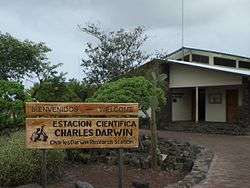Charles Darwin Foundation
The Charles Darwin Foundation was founded in 1959, under the auspices of UNESCO and the World Conservation Union. The Charles Darwin Research Station serves as headquarters for The Foundation, and is used to conduct scientific research and promote environmental education.
The Charles Darwin Foundation is based in Puerto Ayora, Santa Cruz Island, Galápagos, Ecuador.[1]
Charles Darwin Research Station

The Charles Darwin Research Station (CDRS) is a biological research station operated by the Charles Darwin Foundation. It is located on the shore of Academy Bay in the village of Puerto Ayora on Santa Cruz Island in the Galapagos Islands, with satellite offices on Isabela and San Cristóbal islands.
In Puerto Ayora, Santa Cruz Island, Ecuadorian and foreign scientists work on research and projects for conservation of the Galápagos terrestrial and marine ecosystems. The Research Station, established in 1959 and dedicated in 1964, has a natural history interpretation center and also carries out educational projects in support of conservation of the Galápagos Islands, and in support of external researchers visiting the islands to conduct field work.
Objectives and work
The objectives of the CDRS is to conduct scientific research and environmental education for conservation. The Station has a team of over a hundred scientists, educators, volunteers, research students, and support staff from all over the world.[2]
Scientific research and monitoring projects are conducted at the CDRS in conjunction and cooperation with its chief partner, the Galapagos National Park Service (GNPS), which functions as the principal government authority in charge of conservation and natural resource issues in the Galapagos.
The work of the CDRS has as its main objectives:
- To promote, facilitate, design, and implement the scientific investigation necessary for the understanding of biological principles, better understanding of ecosystems, and adequate management of the islands’ natural resources.
- To advise the Ecuadorian authorities on the subject of conservation and management of natural resources in the Galapagos Islands.
- To collaborate with Ecuadorian institutions on the implementation of programs involved in scientific investigation and education on the islands.
- To contribute to the development of scientific and technical personnel from Ecuador who are specialized in natural sciences and natural resource management.
- To contribute and collaborate on educational programs related to the conservation of the islands.
- To compile the results of the scientific investigations and the other activities of the organization and to disseminate this information regionally, nationally, and internationally.
In 2002, the Station was awarded the International Cosmos Prize.
Gallery
- Iguana on the beach at the Charles Darwin Research Station.
- Galapagos Yellow Land Iguana living at the Charles Darwin Research Station.
- Tortoise at the Charles Darwin Research Station.
- Detail of a tortoise head
 Tortoise nursery
Tortoise nursery